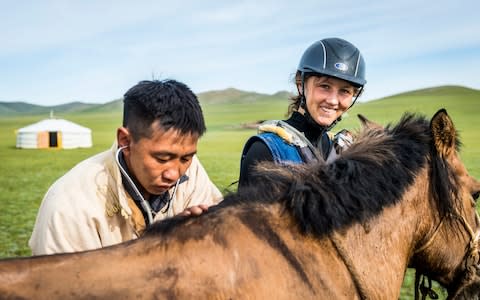‘My period wasn’t my top concern’: Lara Prior-Palmer on bleeding on the saddle during world's longest horse race win

There is a paragraph in Rough Magic, Lara Prior-Palmer’s memoir on becoming the first female, and youngest, winner of the Mongol Derby, the longest horse race in the world, that any woman can relate to – the unexpected, wholly inconvenient arrival of her period.
“As of this morning, I’ve been bleeding onto the saddle,” she writes. “I forgot to take the pills that keep my period away. Its arrival strikes me as odd, perhaps because I feel the Derby has suspended ordinary life’s monthly cycles.”
Prior-Palmer had not been the best prepared for the six-day 1,000 -kilometre race across the Mongolian Steppe, riding around 25 wild ponies along a route based on the horse-messenger system developed by Genghis Khan in 1224. She had signed up seven weeks before the start, about 10 months after every other competitor, and was ignorant of the most basic practicalities. From forgetting to pack toilet roll and naively asking the organisers, “Will anyone be waking us up in the mornings?”, tampons and the contraceptive pill fell pretty low on her agenda.
“It was just another thing to think about,” Prior-Palmer says. “There was so much anxiety about more important things, like whether to take a waterproof jacket. My jodhpurs were blue, so I knew there would be some patch accumulating and I hoped none of the stewards I fancied saw. It wasn’t my top concern, so I just let myself bleed.”
As the only female nominee on William Hill’s Sports Book of the Year Award shortlist, Prior-Palmer says she is keen to talk periods. After all, she says, she almost erased it from the narrative altogether.

“When I was first writing it, a family friend involved in sports journalism saw the period part and she said, ‘I’d take it out, I’m not sure the male readers can deal with that’. As young and naive, I accepted it. A few years later I was like, ‘What the f----, my blood needs to be in this book!’”
Hers is the coming-of-age story of a somewhat privileged teenager, who seemed to have bitten off more than she could chew. Restless on her gap year in 2013, Prior-Palmer, then 19, signed up for a race – with a several-thousand pound entrance fee – which the welcome pack warned could kill participants.
Her aunt, Lucinda Green, a former world champion in eventing, sent her a parting message: “I suspect you won’t make it past day three, but don’t be disappointed.”
“I’d been quite wildly independent growing up,” Prior-Palmer, 25, says of her London upbringing. “I sort of outdid myself though in this. My aunt and the reaction of the other competitors to me made me feel like, ‘Lara this is too bold’ or ‘I shouldn’t really be here’. It’s such a funny story now I think about it, that I ended up winning.”

Prior-Palmer breaks out in hearty laughter, as if only just recognising the bizarreness of it all.
She is genuine in her disbelief. Despite her pedigree, she rode only at weekends and had mere weeks to train. But adapting to the race would have proved difficult regardless: “The Derby is almost impossible to get fit for. Nowhere in the world can you find four fresh horses to ride for 14 hours each day that are wild enough to petrify you, and navigate at the same time.”
About the victory itself, Prior-Palmer is part-embarrassed and part-bemused, like everyone is missing the point in focusing on the end result. But the fact that she went from slowest starter, walking alongside her horse on the first day, to galloping past the race-favourite a day before the finish, is pretty compelling stuff, no?
“I don’t want to modify that I thought it was really cool that I won. When I overtook [the leader], I felt really good,” she admits. “It felt like when you dive into the ocean and are swimming towards the horizon, you’ve left the whole of land, people and buildings behind. Some real great peace overcame me.”
Those same metaphorical, almost philosophical, musings that propel most of our interview are wove into her book. It is full of her most inner thoughts during the race, detail aided by the fact she started writing immediately after winning, before even beginning the journey home.

That process continued throughout her time at Stanford University and then during treatment for Hodgkin lymphoma, a cancer she was diagnosed with at 22. She counts the race and her illness as intertwined experiences: “They both send one out into the wilds, albeit very different wilds. Though I signed up to the race, the terror of it felt boundless. It’s a different terror, but cancer was the same. Then on the morning of my first radiotherapy treatment, I found out I had a book offer. I was gleeful going into radiotherapy.”
Now recovered, she is busy sharing her story but keeping quiet on what comes next as a self-described “distracted athlete”. She is reluctant to commit to another adventure, especially after her first was so on a whim, and finds being boxed into categories generally unappealing. She describes herself as “from the earth – but my passport is British” and is mostly uncomfortable with the glare of attention, inquisitively asking me my thoughts on questions I put to her. She is especially bothered by the apparent reductiveness of arguably her story’s main pull – that of first female Derby winner.
“The whole ‘first’ thing sounded very superficial,” she says. “Horse sport is difficult in that it’s elite and privileged, but it’s often won [by women]. It annoyed me a bit because it’s never useful to be any one thing, so identity politics can be reductive can’t it, in that way?
“It was cool to be the youngest person to finish it ever and then, I guess, win it. I think that meant a lot more.”
If she wins the book prize, she will be just the third female author to do so in its 30-year history. That, she says, is of more acute importance to her in the grand scheme of representation in sport. That she snuck periods into the conversation is a bonus.

 Yahoo Sport
Yahoo Sport 





































